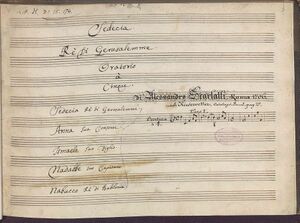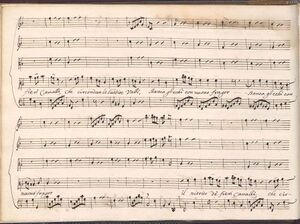Difference between revisions of "Caldo sangue"
Jump to navigation
Jump to search
Cite error:
| Line 96: | Line 96: | ||
{{Template:Song header | {{Template:Song header | ||
| title = Caldo sangue | | title = Caldo sangue | ||
| english-title | | english-title = Two sensations | ||
| composer = [[Alessandro Scarlatti]] | | composer = [[Alessandro Scarlatti]] | ||
| lyricist = [[Filippo Ortensio Fabbri]] | | lyricist = [[Filippo Ortensio Fabbri]] | ||
| Line 111: | Line 111: | ||
If you want to contribute a language not listed below, tell me and I will add it.--> | If you want to contribute a language not listed below, tell me and I will add it.--> | ||
| ancientitalian- | | ancientitalian-note = <!-- leave blank as default--> Ancient Italian Note | ||
| ancientitalian-libretto = Ancient Italian libretto | | ancientitalian-libretto = Ancient Italian libretto | ||
| brazilian-portuguese- | | brazilian-portuguese-note = <!-- leave blank as default--> Brazilian Poruguese Note | ||
| brazilian-portuguese-libretto = Brazilian Portuguese libretto | | brazilian-portuguese-libretto = Brazilian Portuguese libretto | ||
| catalan- | | catalan-note = <!-- leave blank as default--> Catalan Note | ||
| catalan-libretto = Catalan libretto | | catalan-libretto = Catalan libretto | ||
| english- | | english-note = <!-- leave blank as default--> English Note | ||
| english-libretto = English libretto | | english-libretto = English libretto | ||
| french- | | french-note = <!-- leave blank as default--> French Note | ||
| french-libretto = French libretto | | french-libretto = French libretto | ||
| german- | | german-note = <!-- leave blank as default--> German Note | ||
| german-libretto = German libretto | | german-libretto = German libretto | ||
| italian- | | italian-note = <!-- example: "Piedmontese dialect". Leave blank if not needed.--> Italian Note | ||
| italian-libretto = <!-- example: {{lang|it|'''Recitativo''' ..... This field will be automatically styled by the <poem> syntax. --> Italian libretto | | italian-libretto = <!-- example: {{lang|it|'''Recitativo''' ..... This field will be automatically styled by the <poem> syntax. --> Italian libretto | ||
| japanese- | | japanese-note = <!-- leave blank as default--> Japanese Title | ||
| japanese-libretto = Japanese libretto | | japanese-libretto = Japanese libretto | ||
| spanish- | | spanish-note = <!-- leave blank as default, designate for example "Argentinian"--> Spanish Note | ||
| spanish-libretto = Spanish libretto | | spanish-libretto = Spanish libretto | ||
| portuguese- | | portuguese-note = <!-- leave blank as default--> Portuguese Note | ||
| portuguese-libretto = Portuguese libretto | | portuguese-libretto = Portuguese libretto | ||
| polish- | | polish-note = <!-- leave blank as default--> Polish Note | ||
| polish-libretto = Polish libretto | | polish-libretto = Polish libretto | ||
| russian- | | russian-note = <!-- leave blank as default--> Russian Note | ||
| russian-libretto = Russian libretto | | russian-libretto = Russian libretto | ||
| ukrainian- | | ukrainian-note = <!-- leave blank as default--> Ukrainian Note | ||
| ukrainian-libretto = Ukrainian libretto | | ukrainian-libretto = Ukrainian libretto | ||
}} | }} | ||
[[Category:18th-century music]] | |||
[[Category:sacred]] | |||
==Manuscripts and sheet music== | ==Manuscripts and sheet music== | ||
Revision as of 15:38, 26 September 2021
| Il Sedecia, re di Gerusalemme | |
|---|---|
| by Alessandro Scarlatti | |
 First page of Sedecia [1] | |
| English | Zedekiah, king of Jerusalem |
| Year | 1706 |
| Libretto | Filippo Ortensio Fabbri |
| Dedication | Sebastiano Antonio Tanari, cardinal legate |
| Performed | 1706 |
| Premiere | |
| Location |
|
"Caldo sangue"" is an aria sung by the character Ismaele in Part I of the the oratorio Il Sedecia, re di Gerusalemme by Alessandro Scarlatti. The author of the libretto is Filippo Ortensio Fabbri.[2][3][4]
The aria appeared on the following album:
| Year | Album | With | Ensemble | Conductor |
|---|---|---|---|---|
| 2001 | Il Sedecia, re di Gerusalemme (Album) |
|
Il Seminario musicale | Gérard Lesne (dir.) |
Libretto
Caldo sangue
(Two sensations)
from Il Sedecia, re di Gerusalemme
Alessandro Scarlatti (music), Filippo Ortensio Fabbri (words)
|
{{country data {{{country}}}|flagicon/core|variant=|size=}}
| |
| {{{libretto-text}}} | |
Manuscripts and sheet music
- "Sedecia, Re di Gerusalemme". Scores at the International Music Score Library Project. International Music Score Library Project. Retrieved August 21, 2021.
- "Sedecia, Re di Gerusalemme, Libretto". Google Books. Google. 1706. Retrieved September 22, 2021.
References
- ↑ 1.0 1.1 *"Sedecia, Re di Gerusalemme". Scores at the International Music Score Library Project. International Music Score Library Project. Retrieved August 21, 2021.
- ↑ "Fabbri, Filippo Ortensio". Treccani. Istituto della Enciclopedia Italiana fondata da Giovanni Treccani S.p.A. Archived from the original on 2014-06-11. Retrieved 2021-09-22.
- ↑ "OPAC". Scores at the International Music Score Library Project. International Music Score Library Project. Retrieved August 21, 2021.
- ↑ "Fabbri, Filippo Ortensio". Wordcat. Archived from the original on 2021-09-22. Retrieved 2021-09-22.
<ref> tag with name "GoogleBooks" defined in <references> is not used in prior text.